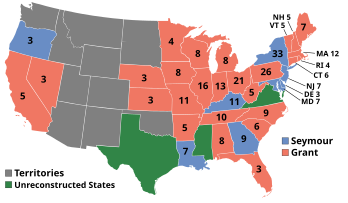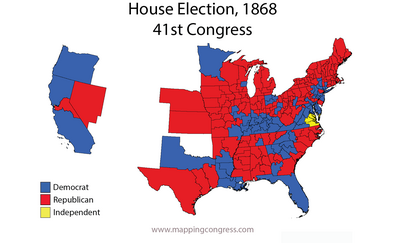1868 United States elections
 From Wikipedia - Reading time: 9 min
From Wikipedia - Reading time: 9 min
| ← 1866 1867 1868 1869 1870 → Presidential election year | |
| Election day | November 3 |
|---|---|
| Incumbent president | Andrew Johnson (Independent)[1] |
| Next Congress | 41st |
| Presidential election | |
| Partisan control | Republican gain |
| Popular vote margin | Republican +5.4% |
| Electoral vote | |
| Ulysses S. Grant (R) | 214 |
| Horatio Seymour (D) | 80 |
 | |
| 1868 presidential election results. Red denotes states won by Grant, blue denotes states won by Seymour, and green denotes states that had not yet been restored to the Union. Numbers indicate the electoral votes won by each candidate. | |
| Senate elections | |
| Overall control | Republican hold |
| Seats contested | 25 of 66 seats[2] |
| Net seat change | 0[3] |
| House elections | |
| Overall control | Republican hold |
| Seats contested | All 243 voting members |
| Net seat change | Democratic +20[3] |
 | |
| 1868 House of Representatives election results
Democratic seat | |
The 1868 United States elections was held on November 3, electing the members of the 41st United States Congress. The election took place during the Reconstruction Era, and many Southerners were barred from voting. However, Congress's various Reconstruction Acts required southern states to allow Black men to vote, and their voting power was significant to the elections results.
In the presidential election, Republican General Ulysses S. Grant defeated Democratic former governor Horatio Seymour of New York.[4] Incumbent President Andrew Johnson sought the 1868 Democratic nomination, but Seymour took the nomination after twenty two ballots.
Democrats gained several seats in the House elections, but Republicans continued to maintain a commanding majority.[5] In the Senate elections, Republicans and Democrats both won seats, but Republicans maintained a huge majority in the chamber.[6]
See also
[edit]- 1868 United States presidential election
- 1868–69 United States House of Representatives elections
- 1868–69 United States Senate elections
References
[edit]- ^ Johnson was elected as vice president on the National Union ticket in 1864 and assumed the presidency in 1865 after the assassination of Abraham Lincoln. After becoming president, Johnson broke with Lincoln's Republican Party, attempted to form his own party, and was a candidate for the presidential nomination at the 1868 Democratic National Convention.
- ^ Not counting special elections.
- ^ a b Congressional seat gain figures only reflect the results of the regularly-scheduled elections, and do not take special elections into account.
- ^ "1868 Presidential Election". The American Presidency Project. Retrieved 25 June 2014.
- ^ "Party Divisions of the House of Representatives". United States House of Representatives. Retrieved 25 June 2014.
- ^ "Party Division in the Senate, 1789-Present". United States Senate. Retrieved 25 June 2014.
 KSF
KSF